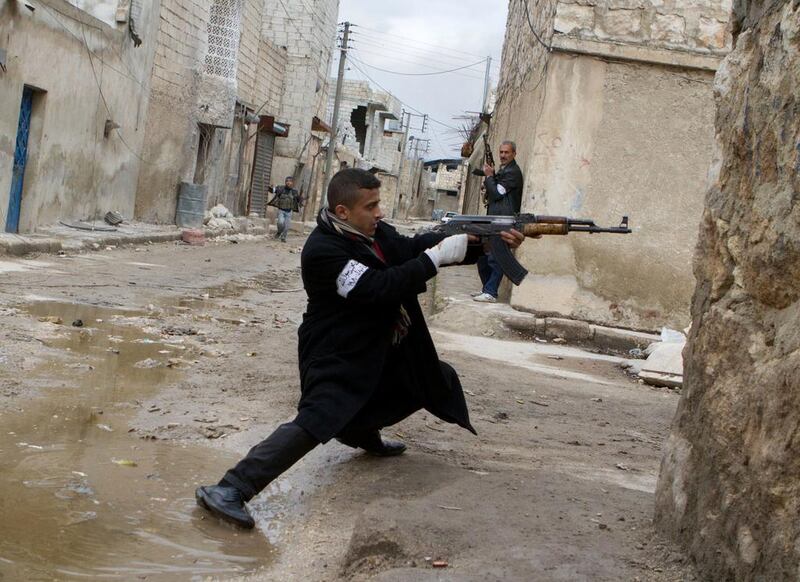If ever there was a moment to end the Syrian conflict, 2013 was it. In that sense, the past year will go down as the great intervention that never was.
Going into 2014, Syria remains the greatest challenge for the Middle East and the worst humanitarian disaster on the planet. A year ago, the situation in the country was dire, yet the narrative from the outside world was very different.
Over the course of 2013, the mood music on the Syrian conflict from the outside world has changed, rising and falling, rising again and finally falling away.
Looking back across the year, three distinct phases can be discerned. The first is best illustrated by a rebel victory at the very start of 2013, when fighters took the Taftanaz military base in the north of the country. Viewed from the outside, this ushered in a window of optimism, when observers thought the rebels might yet unseat Bashar Al Assad.
What is now obvious, but wasn’t as clear then, is that, on the ground, the Syrian conflict had taken a decidedly sectarian and jihadist turn. The failure of the political opposition to provide any sort of alternative to Mr Al Assad, merely squabbling over past grievances, left the Free Syrian Army inside the country to fight without political goals or oversight. That meant that the rebels were not fighting towards the political end, merely to gain territory or remove Mr Al Assad.
Into that space came the jihadists, better armed and funded, with international goals and the experience of fighting in Iraq.
When, in May, Hizbollah confirmed that they were indeed fighting alongside Mr Al Assad’s forces, the transformation of a civil war into a regional conflict was complete. The outside world had delayed so long that Syria, like Lebanon in the 1980s, had become a battleground for other people’s wars.
This escalation gave observers pause. Hizbollah is the most formidable militia in the Middle East, perhaps in the world. Their entry meant two things: Iran was now throwing its weight behind Mr Al Assad, and that a military victory would be much, much harder.
Then in August, the mood music changed markedly. The massacre at Ghouta in August using chemical weapons shocked an international community that was already jaded by the endless civil war.
For a time – looking back, a surprisingly brief time – it looked as if Ghouta would finally be the tipping point, when the protestations of the West over what was happening in Syria would finally translate into action.
And then, like toxic gas, the anger dissipated, as the Assad regime agreed to hand over its stocks of chemical weapons.
The ghosts of Iraq still linger over the West’s foreign policy and an American and British public, now, a decade on, convinced they were deceived over the Iraq invasion, had no appetite to offer politicians a mandate for further intervention.
The establishments of those countries were also sceptical: when I debated the point with the former head of the British army, he wondered what precisely any military intervention would accomplish.
Among analysts, journalists and politicians, fatigue was setting in. There was no will from the West to act decisively, nor any wish to allow other countries, such as Turkey and Saudi Arabia, to take matters into their own hands.
Inside Syria, the rebels were despondent, convinced they were alone.
Ghouta was the last, best chance for the conflict to be brought to some resolution. In that sense, 2013 will likely come to be regarded in the way that 1976 is for the Lebanese civil war – a missed opportunity that could have halted the spiral that came after.
The despondency inside and outside Syria changed the narrative. Talk of intervention fell away, replaced by the best ways to ameliorate the humanitarian crisis, support regional countries and try to contain the conflict.
Journalists – including myself – who had previously been against the idea of Mr Al Assad staying in power began to contemplate a Syria with him.
In December, a former US ambassador to Syria, Ryan Crocker, wrote in The New York Times that “Assad is the least worst option”. It looked like a political trial balloon, floating the idea of normalisation ahead of the Geneva talks in January.
When Barack Obama called the conflict “someone else’s civil war”, it seemed like a recognition that the Syrian conflict possessed no moral pull on the conscience of the world. The single largest humanitarian crisis faced by human beings today was, to the superpower, something that could be contained and then ignored.
It is hard, therefore, surveying the trajectory of the argument over Syria and the trajectory of the conflict, to be optimistic about 2014. And yet, still there are grounds for hope. For even though the chance to end the conflict decisively has passed, that does not mean that Syria is condemned to a long, drawn-out war.
On the contrary, there is still much that can be done. There is much that can be salvaged in Syria. The next round of talks can still determine the outline of a political settlement.
The solution to the Syrian conflict in 2014 will not look like it did in 2013, but there is still a political solution, ugly and unfair though it may be. If Syria remains the biggest story of the Middle East going into 2014, that does not mean it is guaranteed to occupy the same place in a year’s time.
falyafai@thenational.ae
On Twitter: @FaisalAlYafai






